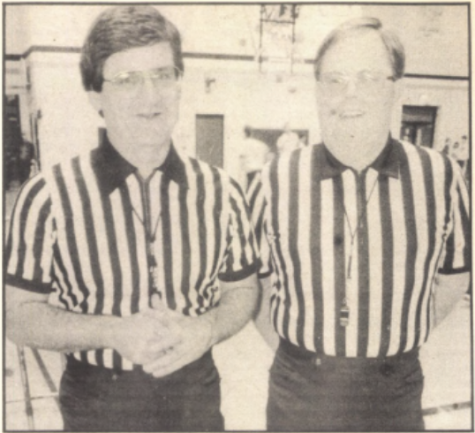Looking back: The officials
This Throwback Thursday, WSS intern Camille Gretter pulls a 1987 article addressing the role of referees in athletics from the archives.
“The officials” by Alex Logan January 30, 1987
Wanted: man who can handle pressure and make the correct call at an important part of a game. Must be able to put all crowd noise behind him and concentrate on what is going on in front of him. Important that he sticks to the call made and if the call is wrong and there is time to correct the call, do so. Must be able to take verbal abuse about his sight, hearing and age. If interested call.
It is time to come out with the fact that in sports the players are not the most important people on the court. Neither are the coaches nor the fans. The most important people on the court are the men in the zebra tops: the referees.
Now, don’t get me wrong, I feel that athletic and coaching ability have a major role in the outcome of a game, but the players and the coaches don’t have the ability to call a foul. Only the referee has that power and, in a close game, a call can be the difference between winning or losing. This point reminds me of Mr. Jim Bain, who is infamous for his last second call against the University of Iowa basketball team in 1982.
The referee lives by the foul. That is his job: to find fouls committed and call them. But are they always the correct calls? No. Referees are human and they can make mistakes just like everyone else. But remember, if there is a complaint about a call, the referee will always be correct.
Officials are practically on stage when they referee a game. The official will want to show that he is a legitimate and capable referee able to call a high school game. Especially when he is making a judgement call where the call could go either way.
The audience’s interaction with the game and the referee will be a major contributor to the way the game is called. An example of this interaction is when the referee calls a foul and will exaggerate his movements to excite or infuriate the crowd. Referees will change their way of calling a game according to the crowd.
A common saying of sportscasters is that the referee is being “worked over” by the coach of a team. It is possible to get a referee scared or intimidated by a coach so the calls will go in favor of that coach. It is hard to say if Trojan basketball coach Bob Norton has scare tactics in his repertoire, but I would not like to call a foul against him when he is in a bad mood.

Another important requirement for referees is that they must be consistent with calls. I have seen all too often a call go one way and the same situation arise again and the call will be different. My philosophy is a consistent referee can be a good referee as long as he calls what I would have called in the situation.
A referee must be his best when the game is close and it is in its final two minutes. That is where any call is important to the outcome of the game. The referee should let the play go as long as it is not a blatant or obvious foul. If the referee does call a foul, it had better be a good call where both teams and fans can agree that it was a foul. If it is a controversial call that could go either way, the referee should give the call to the home team because of the home court fans.
The best games for referees to work are the blow-outs. If it is a blow-out then calls aren’t as controversial and the teams don’t really care because the game is already decided. In a close game, the referee can make either team victorious with one blow of the whistle.
Referees aren’t perfect, but neither is anybody else. A referee goes out on the floor and does the best job he can. There are influences in his decisions but that is part of the game. The next time you yell at the referee, remember that he has feelings too and he is doing his job to the best of his abilities.
Looking back on how opinions of referees have changed
I was intrigued by this article because it provides a different view on a sports game. It shows how difficult it is to be a referee. The constant pressure of making the right call is definitely not something light on the shoulders. I love the way this article shows just how difficult this job is. I know I could never handle the difficulty of trying to please everyone involved. I’ve been to so many sports games in my life, but I don’t think there’s ever been one where the referees don’t get yelled at.
The thing that’s interesting about referees is that they don’t seem to care that much when fans, players, or coaches are upset at them. Obviously not many people know what happens behind closed doors, but none of them seem particularly bothered by any commentary.
It’s been 33 years since this article was written and published. Things since then have changed a lot. Especially social norms. Thirty-three years ago, teenagers in the student section wouldn’t be using profanity, because it wouldn’t be considered to be normal. Nowadays, swear words are something you hear a lot from students because over the years it’s just become more socially acceptable.
Now these new social norms affect referees a lot. Back in the 80’s, screaming at a referee was much more rare. Nowadays, you see it at almost every sporting event. The change in behavior towards referees is crazy, and that’s why I was interested in this article. Bringing this article back from the past and comparing its contents to some articles today is a very interesting thing to do. It provides different information, even if it may be similar to the past.
Another major difference is the beginning of this article. The author, Alex Logan, only refers to referees as men. Now, women and men both take positions as referees. That’s another thing that has changed so much. Back when this archive was published, women were not considered fit for a referee’s job.
Overall, I loved the way this article was written. By bringing this article back up from the past, I hope that more people will read it and understand some of the struggles of referees, and maybe give them less of a hard time. Referees make sports events more interesting, and give them purpose.
Your donation will support the student journalists of West High School. Your contribution will allow us to purchase Scholarship Yearbooks, newsroom equipment and cover our annual website hosting costs.

(she/her) Camille Gretter is a senior at West High and this is her third year on staff. She is the Online Editor-in-Chief, and outside of West Side Story...



